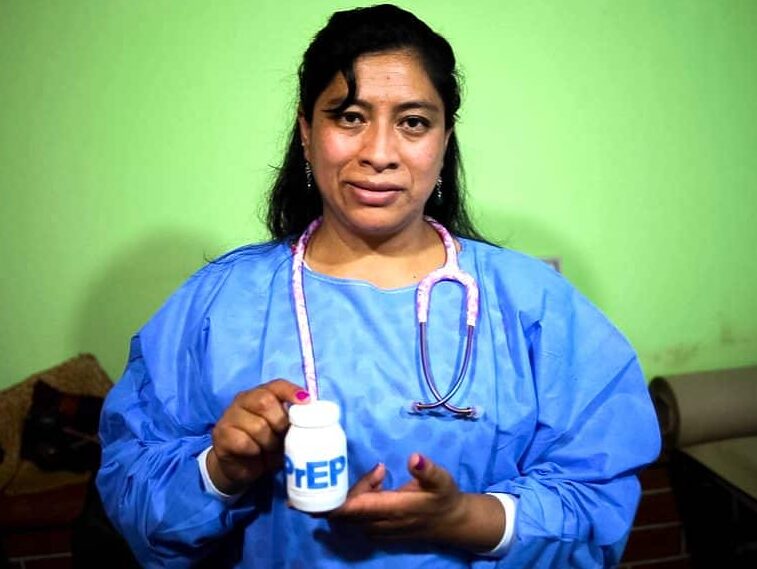A new, comprehensive training package developed by ICAP will give clinical providers around the world – particularly those in the resource-limited countries where ICAP works – the latest technical information on all PrEP products currently endorsed by the World Health Organization (WHO), along with practical guidance for their use in clinical settings.
ICAP’s Pre-exposure Prophylaxis (PrEP) Package for Providers: PrEParing for Choice responds to “a real gap right now in programmatic knowledge and experience in how to present multiple options for PrEP” to clients, explained Julie Franks, PhD, a senior technical specialist in ICAP’s Clinical and Laboratory Unit and an assistant professor of Socio-medical Sciences at Mailman School of Public Health, Columbia University.
“In the global effort to achieve HIV epidemic control, PrEP is the essential counterpart to universal antiretroviral therapy (ART),” Franks said. “To date, initiation and persistence on PrEP has fallen way short of global targets. We need to dramatically improve how we make PrEP accessible to people and support them to use it effectively in their daily lives.”
In 2015, the WHO began recommending oral daily PrEP for people at substantial risk of HIV infection; in response, ICAP created and launched a comprehensive toolkit for daily PrEP in 2017. Since then, however, three more forms of PrEP have been endorsed by WHO: event-driven oral PrEP, long-acting injectable cabotegravir (CAB-LA), and the dapivirine vaginal ring (DVR). ICAP’s new PrEP package covers all four options, each of which are recommended by the WHO for use by specific populations with different needs and preferences.
While the vast majority of clients around the world still rely on oral PrEP – an estimated 5.7 million people globally, according to PrEPWatch – a growing number of countries are clearing pathways to offer CAB-LA and the DVR, including in settings supported by the U.S. President’s Emergency Plan for AIDS Relief (PEPFAR).
ICAP’s PrEP package includes six comprehensive training modules designed to be mixed and matched according to product availability and program training needs. The modules are free to download, along with a variety of job aids, such as checklists, diagrams, and key counseling messages, that health providers can easily reference when they are with clients.
A critical part of the package is the idea of “informed choice,” said Cassia Wells, MD, MPH, a senior technical advisor in ICAP’s Clinical and Laboratory Unit, who spearheaded the package’s creation.
“This is a relatively new concept, this idea of choice, especially around PrEP,” Wells said. “We are trying to prepare for future needs as countries are just beginning to roll out new options. We anticipate that as these options become available, there will be a need for providers to thoroughly understand the differences between them and be equipped to counsel clients to make the choice that is best for them.”
To achieve that, Wells said, will require a major paradigm shift in the way health care providers offer PrEP to clients, which the package tackles in its training module on person-centered PrEP counseling. Many providers are trained in and have long-term experience with ART counseling, which typically focuses on averting the life-threatening progression of HIV disease through consistent, daily adherence to ART. That message, however, doesn’t always resonate with PrEP clients, whose risk for HIV can be episodic and is often one of many other risks they face in their lives. In addition, as countries approve and gain access to additional forms of PrEP, clinical providers will need training on how and when to offer them.
“So the whole approach to adherence has to be different,” Wells said, with an emphasis on putting more control into clients’ hands about when and how they choose to use PrEP. “People are more likely to use a method that fits into their lives. With this package, providers are given the tools they need to help clients make a deliberate choice to protect themselves with the PrEP option that suits them best.”
About ICAP
A major global health organization that has been improving public health in countries around the world for two decades, ICAP works to transform the health of populations through innovation, science, and global collaboration. Based at Columbia Mailman School of Public Health, ICAP has projects in more than 40 countries, working side-by-side with ministries of health and local governmental, non-governmental, academic, and community partners to confront some of the world’s greatest health challenges. Through evidence-informed programs, meaningful research, tailored technical assistance, effective training and education programs, and rigorous surveillance to measure and evaluate the impact of public health interventions, ICAP aims to realize a global vision of healthy people, empowered communities, and thriving societies. Online at icap.columbia.edu








